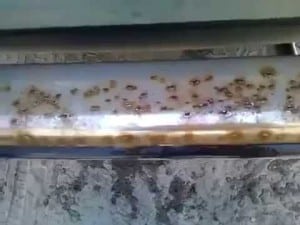Does Road Salt Short Out Electical Wiring?

This is a follow-up post to our February 28 post, “Is Magnesium Chloride Bad for Your Car?” More information has come to light on the subject, and we want to keep you updated. Last month, we discussed magnesium chloride and its effect on plastic, particularly the plastic insulating our vehicles’ electrical wiring. We referred to an article in Colorado’s Vail Daily, in which Colorado mechanics asserted that the compound rots wire insulation. Still, the state Department of Transportation implied otherwise, saying it’s just harmful to chrome.
The Colorado Department of Transportation hasn’t found mag chloride corrosive to rubber and plastic, although it can ruin chrome trim, department spokeswoman Nancy Shanks said.
Now we know why. The Colorado DOT sponsored a study by the University of Colorado at Boulder on how magnesium chloride and sodium chloride (table salt, or, in a less-refined state, rock salt) affect the materials cars are made of, and published its results online. (Corrosion Effects of Magnesium Chloride and Sodium Chloride on Automobile Components – You can see the report here.) The study compared the conditions of various materials before and after exposure such as typically occurring during driving on roads that have been deiced with the compounds. They concluded that both compounds are corrosive, and which one is more corrosive depends on how wet or dry the environment is. The report shows the different amounts of corrosion that occurred from exposing stainless steel, aluminum alloys and copper to the deicing chemicals. One type of stainless steel had a high chromium content, which seems to be the source of the comment about chrome.
published its results online. (Corrosion Effects of Magnesium Chloride and Sodium Chloride on Automobile Components – You can see the report here.) The study compared the conditions of various materials before and after exposure such as typically occurring during driving on roads that have been deiced with the compounds. They concluded that both compounds are corrosive, and which one is more corrosive depends on how wet or dry the environment is. The report shows the different amounts of corrosion that occurred from exposing stainless steel, aluminum alloys and copper to the deicing chemicals. One type of stainless steel had a high chromium content, which seems to be the source of the comment about chrome.
The corrosion severity of the different test materials varied according to what they were made of, whether they were under water or not, and whether the air was humid. But the DOT test did not find the slightest bit of corrosion or decay to plastics, because plastics were not included in the study. Despite the fact that the stated purpose of the study was to test “automobile components,” the actual materials tested were exclusively metals. It is probably always wise to check for the reasoning behind a statement, especially when something as expensive and potentially dangerous as your vehicle’s electrical system is at stake. In the debate about whether magnesium chloride can cause your wires to short out, it seems that only one side is actually speaking: mechanics say it can, and the Colorado DOT, it turns out, isn’t saying anything. If you look closely at the quotation from the article, you’ll see the wording is “hasn’t found mag chloride corrosive to rubber and plastic,” not “has found mag chloride not corrosive to rubber and plastic.”
Sometimes, word order really makes a difference. If you’re in or near New Hampshire and concerned about decay to your vehicle caused by magnesium chloride or any other source, check out the selection of rustproofing services provided by The Rust Stop Pros. From Rustoration of older vehicles to proactive treatment of new ones, The Rust Stop Pros has the answer to rust (and plastic corrosion) problems for every vehicle.

 Buy US Direct
Buy US Direct Buy CA Direct
Buy CA Direct Buy EU Direct
Buy EU Direct Buy DE Direct
Buy DE Direct